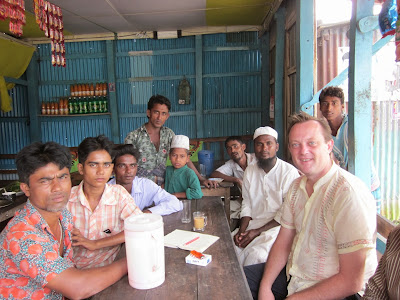Photos from Monpura:
 |
| With the adda circle, the conversationalists, in the Ibrahim Store, Badher Bazaar, Monpura. |
 |
| With Salman Hossein Saju to my left, adda in full swing at the Ibrahim Store. |
 |
| Taking a dip at the College Pond is a good remedy for the heat of the day. |
Notes:
Directly after Durga Puja this year, only a day or two later, came the Muslim holiday of Eid al-Adha. In Bangladesh most people like to retire to the village home for Eid. The city of Dhaka is half empty of people during these days. With Monpura just one hour by ship from the village that became my home over the last 18 years, on the island of Hatiya, it was a great opportunity to spend the holiday in the village rather than back in Dhaka.
After four days it was already so that while walking in the main bazaar of Hazirhat random people would greet me. Perhaps they were customers of the Ibrahim Store or had seen me at one of the Durga Puja pandals? The barbers at one of the barber shops were relatives of a good friend of mine from Hatiya and there were one or two other Hatiyala connections there.
All transport around the island was by motorcycle since there is no public bus, and it was easily arranged at the Ibrahim Store. Thus I arrived at the ghat at 5:30 a.m. to meet the ship to Hatiya. At the ghat were no less than three greetings from Monpurans who must've been meeting other friends or relatives, and no less than three invitations to return and visit again!
Meanwhile, on reaching Hatiya I discovered my friend who was supposed to pick me up by Honda from the ghat had accidentally fallen asleep again and would be late. There was time for tea with Emran, from my village, who was picking up his sister-in-law and who I've known for most of twenty years.
Then on heading into Tomoruddin Bazaar, where the ghat is, a Honda stops to offer a lift. I'm not sure who the rider and passenger are but they know me. So we head, three on one bike, to the main town of Ochkhali, and along the way the rider explains that he is the son of an Imam who used to work at the mosque at local Bota Market, not far from my village home. His father works at another mosque these days but that is how they know me.
All was as usual in Hatiya - meetings, greetings, the Bengali family and friends.
Except that the villagers in Azizia Bazaar had decided I needed an office, a tin roof bazaar office that usually belongs to the Bazaar Committee there. Electricity in Hatiya only runs for a few hours of an evening, and only in the bazaar - so when the sun set I'd be 'off to work', at my office! The villagers used to keep the public out most of the time, so I could concentrate on writing - and then there were times for adda. Strangely, on one occasion a marriage contract was drawn up in front of me, and unexpectedly I was asked to be a witness to it. The bride and groom weren't there, only their fathers who both seemed to be decent people.
'How old is the bride?' I asked.
'Eighteen,' they said - but they know that is the correct answer. 'What kind of eighteen? Does eighteen mean eighteen?' They said it did.
'Well go easily with the new couple,' I said, not that I should be giving advice, 'No in-law problems, no dowry, and all will be well!' Unlike in most of Bangladesh in Hatiya dowries for Muslims are not common anyway, but can occur.
Thus I witnessed the agreement.
On Eid Day I didn't go to the mosque this year, though in the past I have, sitting quietly up the back. All the friends and neighbours are there, so it always seemed a shame I couldn't go simply due to my Christian background.
Meanwhile there were daily calls - just as we rehearsed but without climbing a tree for reception - from Monpura, from Saju, Bimal, Hasan and others. I definitely needed to go back to Monpura, Saju said, because when I visited his house, his mother was away in Bhola and she wanted to see what I looked like, observe how I was. Well, there's really no saying no to Saju's mother - at some point in the future I just need to find the time!
But there was a bit of administration to do in Dhaka... before setting out for a new district.
Photos from Hatiya:
 |
| In 'my office' at Azizia Bazaar in Hatiya. |
 |
| Adda at the office: Rofiq, Salim and the gang. |
 |
| Another moment of office adda: Soleiman, Nobir (boss), Ashraf and Situ are there. |
 |
| In Azizia, everybody is 'wellcome' - so welcome that a double 'l' is needed to describe just how welcome they are! |
 |
| Khair Kaka (Uncle) holds the scales while our householders divide the beef . It's an Eid al-Adha tradition. |


Nice... I looks like you are really have fun and enjoying every moment with the adda circle.
ReplyDeleteThis piece is just the right length Andrew and the photos always enhance the atmosphere. (Sometimes I get a bit lost in the meandering of your writing which possibly reflects the pace of life where you are. What a beautiful baby above your Bengali mother is holding. I am intrigued by the light coloured clear eyes that look almost blue. I like the notion of "trying out a name" for a young child too.
ReplyDelete